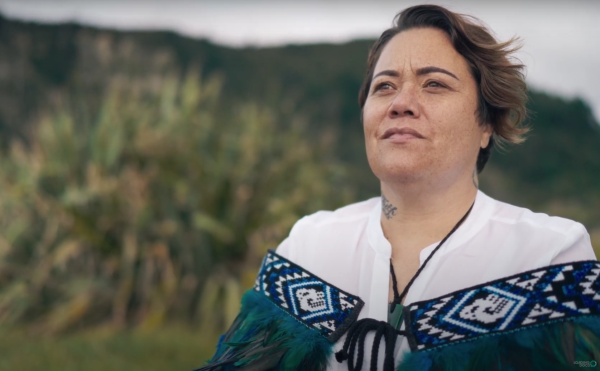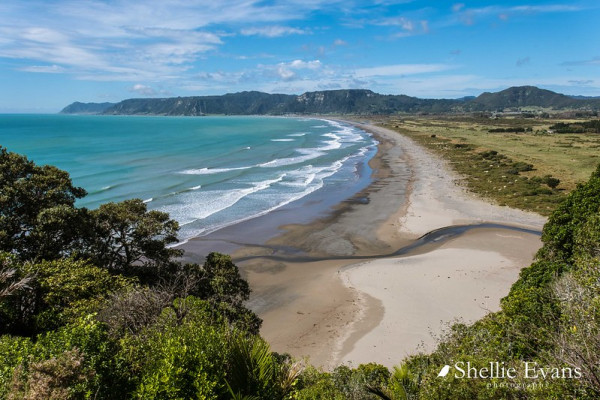Mana Over Meth is a short documentary and a powerful story of the ways connection helps overcome addiction. We spoke to the two wāhine behind this incredible short documentary about how it came to be, the impact the doco has had and what’s next.
Meeting through recovery
Jessica Apanui (Ngāti Porou) and Holly Beckham (Ngāpuhi, Ngāti Rangi) met online through addiction recovery groups. Jess had already been speaking publicly about her journey to overcome methamphetamine addiction, including some of the rawest moments. “I got out of rehab, relapsed, and then started filming my journey [to post on social media] at only 30-60 days clean,” says Jess.
“I didn’t think about negativity or the trolls. The feeling was: if I’ve been doing this stuff for 25 years, and now I don’t need to use it everyday, others can do the same.”
Holly had her own struggles with addiction, but going to film school helped her find a way to tell her story. She interviewed Jess for her previous documentary, then together they realised that between them they had the skills to tell the powerful story of Jess overcoming addiction.
 Still of Jess Apanui from Mana Over Meth
Still of Jess Apanui from Mana Over Meth
Telling a difficult story
Both Holly and Jess realised that filming this story had the potential to be tricky for both of them, because they were retreading territory that carries a lot of emotional weight, and exploring potentially traumatic memories.
Holly says they wondered if it might be too much for Jess to reenact herself going through some of the harder moments of her life, and worried about how it might impact Jess so early in her recovery. “We weren’t really that far clean – only a couple of years,” Holly says.
The pair did a test run and ended up getting Jess to audition for her own part. Holly says, “That was eye-opening because I watched Jess go back into her past, and then come back into herself [in the present].”
It made sense for Jess to tell her own story, though it wasn’t always easy. For Jess particularly, a lot of the emotion behind the scenes was real.
“It was intense. It was emotional,” Jess says. “During the raid scene, I was to the right of them peeking through the door, seeing what was going on. I cried, reliving all of that. The using scene – all of these feelings and emotions were real. The tears were real. All of it was real.”
The scene Jess is referring to features her struggling to inject meth, alone in the shower. Holly says the whole crew went on a journey with Jess as they shot that scene, reliving a deeply personal and intense moment.
Holly felt the impact too, particularly around [connection to whakapapa]. During the final scene, where Jess returns to her whānau land and plants a tree to signify her connection to her whakapapa, Holly says she just broke down and cried.
Both wahine went into the filming of the documentary knowing that challenging emotions would arise. What helped keep them grounded?
"Karakia, that was our main one. Breathwork, putting your feet on the grass. [Breathing] in and out to settle yourself - which aligned with te ao Māori and going to Tangaroa."
Holly Beckham, filmmaker
“Karakia, that was our main one. Breathwork, putting your feet on the grass. In and out to settle yourself – which aligned with te ao Māori [and] going to Tangaroa,” says Holly.
Both Holly and Jess agree that these basic tools are essential and accessible. They’re ones that both women picked up along their path away from addiction.
 Te Araroa beach, near Jess' hometown. Photo CC-BY-2.0, by Shellie Evans
Te Araroa beach, near Jess' hometown. Photo CC-BY-2.0, by Shellie Evans
What helped Jess and Holly overcome addiction?
Jess says she first started detoxing on her own, before joining a residential programme for three months.
For her, healing culturally and in connection with others was an essential part of overcoming addiction. “Rongoa, community programmes, community groups – techniques like gratitude lists, journalling, finding your people, connection is key,” she says. “I did hard already in addiction.”
Jess also says that connecting back to her whakapapa has been huge in her healing.
"My maunga, my awa, my whēnua. Connecting with my whānau, and carrying through practices like waiata and kapa haka. That changed everything for me."
Jess Apanui
“My maunga, my awa, my whēnua. Connecting with my whānau, and carrying through practices like waiata and kapa haka. That changed everything for me – that makes you spiritually connected,” says Jess.
“You don’t have to do it on your own. There are government organisations and facilities. People aren’t aware of the options. There needs to be more promotion of support services available to people going through addiction.”
“Everybody deserves a choice,” states Jess, “And I am responsible and obligated to make sure people have that choice.”
Holly says she took more of a mental health route, seeking support from mental health and addiction services. She came across a mode of therapy called dialectical behaviour therapy that she says was the biggest thing for her. “It enabled me to process that trauma from my past.”
Both Holly and Jess are clear that there is no one-size-fits-all solution, and there are different pathways into different services. If you’re looking for a service that may be able to help you with addiction issues, head to our Finding Support page.
What’s next for Mana Over Meth?
Mana Over Meth has caused ripple effects throughout the motu, and internationally.
Jess and Holly have developed a Kura Kaupapa programme that has allowed them to go back to the schools in their hometowns to show rangatahi there’s another way, if they’re facing challenges – that they don’t have to turn to methamphetamine.
Holly in a classroom, delivering the Kura Kaupapa programme
Jess speaks of the power that came from giving back to her own hapori. “We used purakau, storytelling of our experiences, as well as humour to teach them how to use the resources we gave them. We didn’t just want to leave them with nothing,” she says.
Both say they’re grateful for the opportunity to give back to iwi and hapū.
Then something huge happened - Mana Over Meth got into the world’s biggest recovery symposium festival in Los Angeles, Hollywood. Jess was unable to travel, so Holly went along with Mamaeroa, a young woman they had started working with through their programmes.
Holly and Mamaeroa introduced themselves on stage with pepeha, karakia and waiata. Holly says the audience were spellbound.
“We got to meet recovering addicts over there,” says Holly. “Recovery looks different for everybody, but it made us grateful for the recovery we had in Aotearoa.”
Holly at the Reel Recovery film festival in Los Angeles
What Holly and Jess would say to others looking to overcome addiction
“Make a decision and go with it,” says Jess. “Invest in yourself because you’re worth it. It’s a shit road for addicts because we all take it to the bitter end or we’re half-dead, before we go ‘I think I’ve had enough’. That’s part of what we’re trying to do with Mana Over Meth – showing people how you can have this new life.”
Jess says it’s okay to shop around to find support that works for you.
"It doesn't have to be the twelve steps! If that path you're on isn't working for you, choose a different path. And keep walking."
Jess Apanui
“It doesn’t have to be the twelve steps! If that path you’re on isn’t working for you, choose a different path. And keep walking.”
In this article, Jess and Holly refer to their journey of recovery from addiction as ‘getting clean.’ While this reflects their personal experiences and choice of language, we acknowledge that the term ‘clean’ can be seen as stigmatizing, as it implies that those who still use drugs are ‘dirty.’ It's important to recognize that recovery is a personal and varied process, and we encourage everyone to use respectful, non-judgmental language when talking about other's experiences.
About Holly:
Tu Rangatira tōku maunga Ko Poērua
Rere ana tōku awa Ko Kirikiri
Hoe tōtika ana tōku waka Ko Ngatokimatawharua
Ngāpuhi tōku iwi whanui
Ngāti Rangi tōku hapū Whakanui
Ngawha toku marae tu pakari e
Ko Holly Beckham tōku ingoa
Holly Beckham is one of the new generation of Māori wāhine in the New Zealand film and television industry. A documentary director, her kaupapa is to give voice to others.
Holly's first powerful documentary about addiction He Ara Anō has won numerous awards and has been shown at festivals globally and in Aotearoa. She has gone on to Produce and direct Mana over Meth another short documentary about addiction.
Holly is proud of her Ngāpuhi, Ngāti Rangi heritage and knows that it is what makes her storytelling approach so strong. As a recovering addict who is 5 years clean, she is ideally placed to tell the story of Mana Wāhine.
About Jess:
Jessica Apanui's methamphetamine addiction began as an escape from the trauma of a violent childhood. But after years of chronic abuse, she made the decision to break the cycle for her own tamariki
Hailing from Te Araroa, Jess grew up in a West Auckland home of violence and substance abuse: Jess was witness to things she can never unsee. At the age of 12, Jess started using drugs as a way to fit in and to mask the hurt and fear she was experiencing.
Her life continued to spiral out of control, hoping that becoming a mother would be the change she needed. Unfortunately, meth had sunk its hooks in deep and Jess had no way out. Eventually she started manufacturing meth in her West Auckland home.
Today, Jess is 5 years clean with the gift of Recovery. Now an advocate for helping whānau who are trying to get clean, she documents her journey on her Facebook page Life Beyond Meth (LBM) with 14,000 followers. Jess is a busy mother but is still committed every day to change her community, one addict at a time.
Related stories
Recent stories
Tū Whakaruruhau: the study exploring meth experiences
Tū Whakaruruhau study aims to understand more about people's experiences with meth and learn how to help people overcome addiction.
Four things you need to know about the latest overdose stats
We take a look at the latest stats on overdoses in New Zealand, and what we can learn about staying safer with drugs.
Answering your questions about the meth disguised as lollies
To help clear things up, we’ve answered your most common questions.